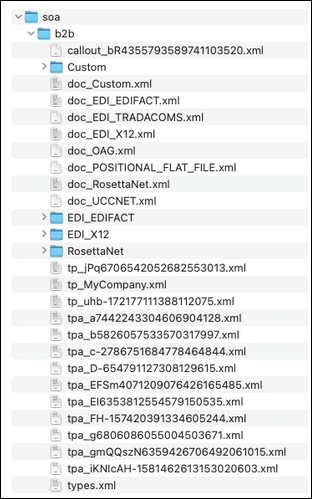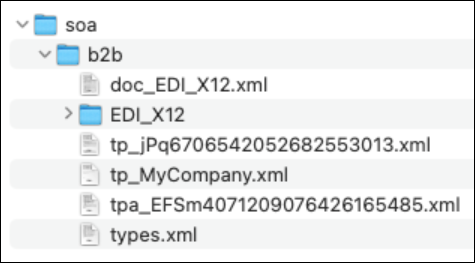Migrate B2B Artifacts from Oracle SOA Suite to Oracle Integration
You can migrate B2B artifacts from Oracle SOA Suite to Oracle Integration. Migration involves exporting a ZIP file of B2B artifacts, then importing those artifacts into Oracle Integration through use of a REST OpenAPI interface and a REST client tool such as Postman.
Which B2B Artifacts Can Be Migrated
Before beginning migration, it is important to understand which B2B artifacts in Oracle SOA Suite can be migrated to Oracle Integration.
| Can Be Migrated | Cannot Be Migrated |
|---|---|
|
The following artifacts are ignored if included in the exported ZIP file.
|
How Do You Migrate B2B Artifacts
| Scope of Export | Description | Example |
|---|---|---|
| Entire repository (in a ZIP file) | The ZIP file consists of all data in the B2B design-time repository, including agreements in all states, all trading partner configurations, and so on. |
 |
| Single agreement (in a ZIP file) | The ZIP file consists of data in one selected active agreement, including all data in the B2B design-time repository such as all agreements in active states, all trading partner configurations, and so on. |
 |
| Multiple agreements (one ZIP file per agreement inside a parent ZIP file) | Multiple selected active agreements, including all data in the B2B design-time repository, such as agreements in active states, all trading partner configurations, and so on. |
 |
Migrate B2B Artifacts to Oracle Integration
Note:
You cannot migrate B2B artifacts from Oracle SOA Suite into a project in Oracle Integration. Only standalone (that is, nonproject) environments are supported.- Export the Oracle B2B artifacts in Oracle SOA Suite.
See Importing
and Exporting Data in Using Oracle
B2B. The export utility performs the following
tasks:
- Exports all resources: Exports all active and inaction agreements.
- Exports selected agreements: Allows only active agreements.
When the ZIP file is imported into Oracle Integration, whatever the specific contents are of the file are imported.
- Invoke the REST OpenAPI interface to import the ZIP file. See Trading Partner Migration from SOA-B2B REST Endpoints in the B2B section of the Developer API for Oracle Integration 3.
- Open a REST client. For this example, Postman is used.
- In the Value column, click Select Files.
- Select the ZIP file to import into Oracle Integration, then click
Send.

- Sign in to Oracle Integration.
- In the navigation pane, click B2B, then Trading partners.
- Open each trading partner to see the artifacts populated in the Properties, Contacts, B2B identifiers, and Transports & agreements sections.
- Click View
 for a transport name in the Transports
& agreements section and note that a
placeholder connection has been populated into the
Trading partner's connection (trigger and
invoke) field.
for a transport name in the Transports
& agreements section and note that a
placeholder connection has been populated into the
Trading partner's connection (trigger and
invoke) field.
- Scroll to the bottom of the Transports & agreements section and note that template integrations have been generated.
- Click Host profile, Schemas, and Documents to see the imported artifacts.
- In the navigation pane, click Design, then Connections.
- Note that a connection has been created for the transport. Update your connection with the endpoint to use. Perform this task for any other connections created by the import.
- Return to the Transports & agreements section.
- Find the transport name with the placeholder connection.
- From the Actions
 menu, select Deploy to
deploy the transport. Perform this task for any other
connections created by the import.
menu, select Deploy to
deploy the transport. Perform this task for any other
connections created by the import.
- In the navigation pane, click Design, then Integrations. to view the template integrations that were created.